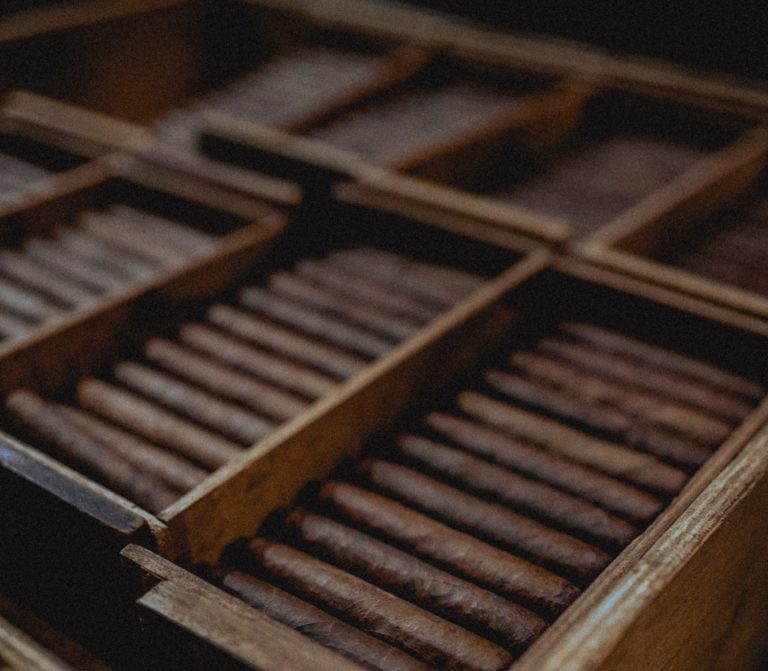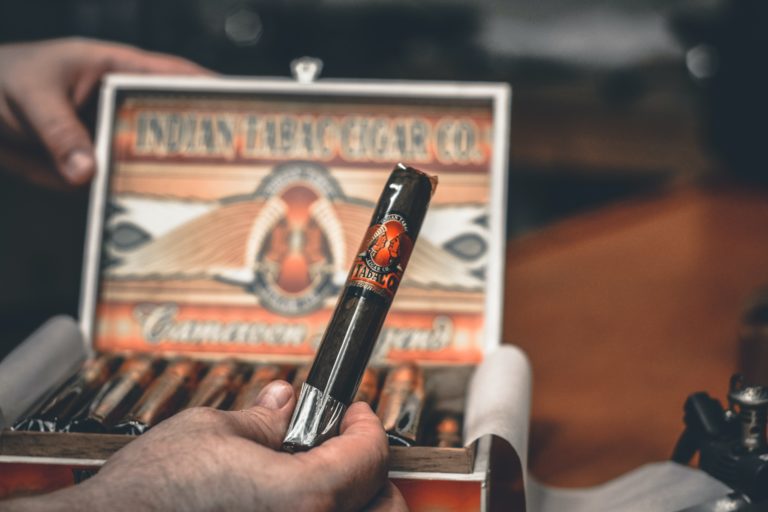How to Properly Store Cigars
When we embark on our journey into the world of cigars, one of the first lessons we learn is the importance of proper storage. Cigars are not just mere products; they are delicate creations that require specific conditions to maintain their quality and flavor. The way we store our cigars can significantly impact their taste, aroma, and overall smoking experience.
Understanding the nuances of cigar storage is essential for both novice enthusiasts and seasoned aficionados alike. Cigar storage is a blend of art and science. It involves creating an environment that mimics the natural conditions in which cigars thrive.
Factors such as humidity, temperature, light exposure, and air circulation all play crucial roles in preserving the integrity of our beloved cigars. As we delve deeper into the intricacies of cigar storage, we will uncover the best practices that ensure our cigars remain fresh and enjoyable for years to come.
Key Takeaways
- Proper cigar storage is essential for maintaining the quality and flavor of your cigars.
- Choosing the right humidor is crucial for keeping your cigars in optimal condition.
- Maintaining proper humidity levels is key to preventing your cigars from drying out or becoming too moist.
- Temperature control is important for ensuring that your cigars age gracefully and don’t develop mold.
- Regular rotation and organization of your cigars can help ensure even aging and prevent any from being forgotten.
Choosing the Right Humidor
Size Matters
When choosing a humidor, it’s essential to consider the size of our collection. Whether we’re casual smokers or dedicated collectors, we need to ensure that our humidor can accommodate our needs.
Material and Design
The material of the humidor also plays a significant role in its effectiveness. Many humidors are crafted from Spanish cedar, a wood known for its ability to retain moisture while imparting a pleasant aroma to the cigars. The design of the humidor should also be taken into account, including features such as a reliable sealing mechanism to prevent air from escaping.
A Well-Constructed Humidor Enhances the Smoking Experience
A well-constructed humidor not only protects our cigars but also enhances their aging process, allowing us to enjoy a richer smoking experience. By selecting the right humidor, we can ensure that our cigars remain fresh and flavorful for years to come.
Maintaining Proper Humidity Levels

Once we have chosen the right humidor, the next step is to maintain proper humidity levels. The ideal humidity range for storing cigars typically falls between 65% and 75%. If the humidity is too low, our cigars may dry out, leading to a harsh smoking experience.
Conversely, excessive humidity can cause mold growth and ruin the flavor profile of our cigars. To achieve this delicate balance, we can utilize various tools such as hygrometers and humidifiers. Regularly monitoring humidity levels is essential for ensuring our cigars remain in optimal condition.
We should check the hygrometer frequently and make adjustments as needed. If we find that the humidity is consistently low, we can add distilled water or propylene glycol to our humidification device. On the other hand, if humidity levels are too high, we may need to open the humidor briefly to allow excess moisture to escape.
By staying vigilant and proactive, we can create an environment that nurtures our cigars.
Temperature Control
In addition to humidity, temperature control is another critical aspect of cigar storage that we must not overlook. The ideal temperature for storing cigars typically ranges from 65°F to 70°F (18°C to 21°C). Temperatures outside this range can lead to undesirable consequences.
For instance, if our cigars are stored in a location that is too warm, they may age too quickly, resulting in a loss of flavor and aroma. Conversely, storing them in a cooler environment can slow down the aging process and affect their overall quality. To maintain consistent temperature levels, we should avoid placing our humidor near heat sources such as radiators or direct sunlight.
Instead, we can choose a cool, dark place in our home for storage. If we live in an area with extreme temperature fluctuations, investing in a temperature-controlled humidor may be worthwhile. This investment ensures that our cigars are kept at a stable temperature year-round, allowing us to enjoy them at their best.
Rotation and Organization
As we build our cigar collection, organization becomes paramount. Proper rotation and organization not only help us keep track of our inventory but also ensure that all our cigars receive equal exposure to humidity and temperature. When we store cigars in a humidor, it’s easy for some to be overlooked while others are consumed more frequently.
To prevent this imbalance, we can implement a rotation system. One effective method is to arrange our cigars by type or brand and then rotate them periodically. This way, every cigar has a chance to breathe and benefit from the controlled environment of the humidor.
Additionally, labeling our cigars with purchase dates can help us keep track of their age and ensure that we smoke them at their peak flavor profile. By maintaining an organized humidor, we enhance our overall cigar experience and minimize waste.
Avoiding Light and Air Exposure

Protecting Cigars from Light Exposure
Light and air exposure are two primary enemies of cigar preservation that must be actively guarded against. Ultraviolet (UV) light can degrade the tobacco leaves over time, leading to a loss of flavor and aroma. Therefore, it’s crucial that we store our cigars in a dark place or within a humidor that has a solid or tinted lid to block out harmful light rays.
The Importance of Minimizing Light Exposure
By minimizing light exposure, we can help preserve the integrity of our cigars for longer periods. This simple step can make a significant difference in maintaining the quality and flavor of our cigars.
Combating Air Exposure
Air exposure is another factor that can negatively impact our cigars. When cigars are exposed to air for extended periods, they can dry out or become stale. To combat this issue, we should ensure that our humidor is properly sealed when not in use. Additionally, when we open the humidor to select a cigar, it’s best to do so quickly to minimize air exchange.
Creating a Protective Environment
By taking these precautions, we can create an environment that protects our cigars from both light and air exposure. This will help to preserve the flavor, aroma, and overall quality of our cigars, ensuring a more enjoyable smoking experience.
Proper Storage for Different Types of Cigars
Not all cigars are created equal; different types may require specific storage considerations. For instance, flavored or infused cigars often have added oils and sugars that can alter their storage needs compared to traditional tobacco cigars. We should be mindful of these differences when organizing our collection.
Flavored cigars may benefit from being stored separately to prevent their unique aromas from affecting other cigars. Additionally, larger ring gauge cigars may require more space within the humidor than smaller ones. As we curate our collection, it’s essential to consider these factors to ensure each cigar receives the care it deserves.
By understanding the specific needs of different types of cigars, we can optimize their storage conditions and enhance our overall enjoyment.
Tips for Long-Term Storage
For those of us who plan on storing cigars for an extended period, there are several tips we can follow to ensure their longevity. First and foremost, regular maintenance of our humidor is essential. This includes cleaning it periodically and replacing any worn-out humidification devices or hygrometers as needed.
A well-maintained humidor will provide a stable environment for our cigars over time. Another tip for long-term storage is to avoid overfilling the humidor. While it may be tempting to pack it full of cigars, overcrowding can hinder airflow and lead to uneven humidity distribution.
Instead, we should aim for a balance between quantity and quality in our collection. Lastly, patience is key when it comes to aging cigars; some blends improve significantly over time while others are best enjoyed fresh. By following these tips and being mindful of our storage practices, we can ensure that our cigars remain in excellent condition for years to come.
In conclusion, proper cigar storage is an essential aspect of enjoying this timeless pastime. By understanding how to choose the right humidor, maintain humidity and temperature levels, organize our collection effectively, and protect against light and air exposure, we can create an optimal environment for our cigars. With these practices in mind, we can savor every moment spent with our favorite smokes while ensuring they remain fresh and flavorful for future enjoyment.
FAQs
What is the best way to store cigars?
The best way to store cigars is in a humidor, which is a specially designed box that maintains a constant level of humidity to keep the cigars fresh.
What is the ideal humidity level for storing cigars?
The ideal humidity level for storing cigars is between 65-70%. This helps to keep the cigars from drying out or becoming too moist, which can affect their flavor and burn.
How should cigars be stored in a humidor?
Cigars should be stored in a humidor with plenty of space between them to allow for proper air circulation. They should also be stored away from direct sunlight and in a cool, dark place.
Can cigars be stored in a regular household container?
While it is possible to store cigars in a regular household container, such as a Tupperware or Ziploc bag, it is not recommended for long-term storage. These containers do not provide the same level of humidity control as a humidor and can lead to the cigars drying out or becoming too moist.
How long can cigars be stored in a humidor?
When stored properly in a humidor, cigars can be kept fresh for an extended period of time, often years. However, it is important to regularly check and maintain the humidity levels in the humidor to ensure the cigars remain in optimal condition.


